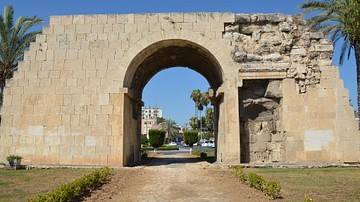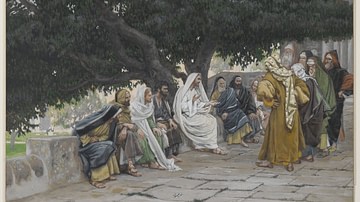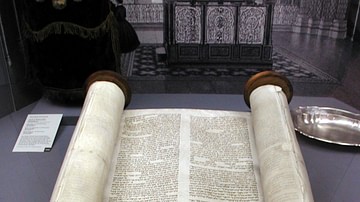Search
Did you mean: Feudalism?
Search Results

Definition
Moses
Moses (c. 1400 BCE) is considered one of the most important religious leaders in world history. He is claimed by the religions of Judaism, Christianity, Islam and Bahai as an important prophet of God and the founder of monotheistic belief...

Article
Ancient Israelite & Judean Religion
As early as the 10th century BCE, Israelite and Judean religion began to emerge within the broader West Semitic culture, otherwise known as Canaanite culture. Between the 10th century and 7th centuries BCE, ancient Israelite and Judean religion...

Definition
Cilicia Campestris
Cilicia Campestris was one of the six districts of the Roman province of Cilicia organized by Pompey the Great (l. c. 106-48 BCE) in 64 BCE. The name translates roughly into “Cilicia of the Plains” and corresponds to the earlier name for...

Definition
The Bar-Kochba Revolt
The Bar Kochba Revolt (132–136 CE) was the third and final war between the Jewish people and the Roman Empire. It followed a long period of tension and violence, marked by the first Jewish uprising of 66-70 CE, which ended with the destruction...

Definition
Sadducees
The Sadducees were part of the upper-class aristocrats and provided much of the priesthood, categorized through the lineage of priestly houses. They served on the Sanhedrin, the city council that organized law courts and regulations, which...

Definition
Trinity
The Christian doctrine of the Trinity (from the Latin trinus, meaning "threefold") professes that there is one God, but three eternal and consubstantial persons (aspects): the Father, the Son, and the Holy Spirit. The Father is the God of...

Definition
Easter
Easter is the Christian holiday that celebrates the resurrection of Jesus of Nazareth three days after he died from crucifixion by the Roman magistrate Pontius Pilate (c. 30 CE). Easter Sunday is the culmination of the week-long events that...

Article
Interview with Barry Strauss: Jews vs. Rome - The Latest Book by Barry Strauss
For over two centuries, ancient Judea was a restless province of the Roman Empire, marked by rebellions, shifting loyalties, and the tensions between imperial might and local identity. In his latest book, Jews vs. Rome: Two Centuries of Rebellion...

Definition
Torah
The Torah, also known as the Pentateuch (from the Greek for “five books”), is the first collection of texts in the Hebrew Bible. It deals with the origins of not only the Israelites but also the entire world. Though traditionally the Hebrew...

Article
Historical Problems in the Trial(s) & Crucifixion in the Gospels
The story of the trial and crucifixion of Jesus Christ is reenacted every year by Christians all over the world in the Easter liturgy. The story has become an essential article of faith and is rarely questioned by New Testament scholars and...